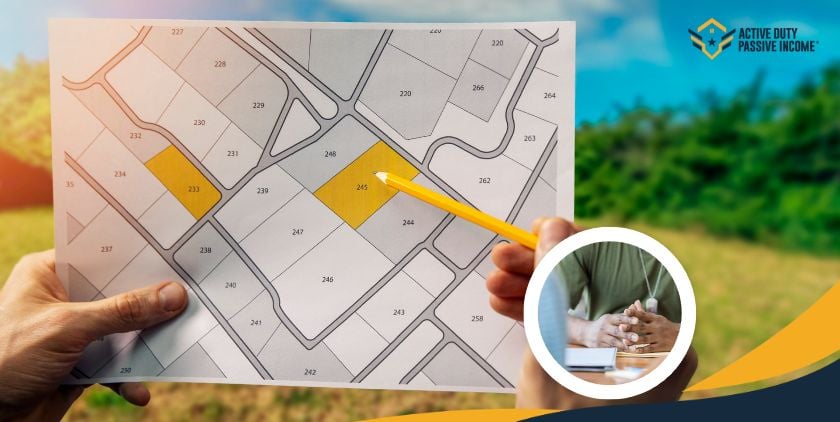Can You Use a VA Loan to Buy Land?
Yes, it is possible to use a VA loan to buy land. However, there are specific requirements and considerations involved. In order to use a VA loan for land purchase, the land must be intended for construction of a primary residence.
The VA loan can cover both the land purchase and construction costs, providing a streamlined financing option for eligible veterans. It’s important to understand the VA loan requirements and guidelines, including credit score, income qualifications, and property appraisal. Consulting with a knowledgeable VA loan specialist can help navigate the process and determine if using a VA loan for land purchase is the right choice for you and to determine if the lender can issue and support such loans.
Many VA loan beneficiaries are not aware that the VA loan is not a buy land and hold product. The intent and plan to build must be present for a lender to be able to support. Many have succeeded in utilizing the VA loan benefits to buy the land and build it and if this interests you let’s start getting you fully prepared to buy that land!

Veteran Eligibility
Veteran eligibility for a VA loan to buy land follows certain criteria set by the Department of Veterans Affairs.
To qualify, you must meet one of the following conditions:
- Active duty service members with a minimum of 90 consecutive days of service during wartime or 181 days during peacetime.
- Veterans who have been honorably discharged after serving at least 90 consecutive days during wartime or 181 days during peacetime.
- National Guard or Reserves members who have completed at least six years of service, always have the lender check qualifications as they do change.
- Surviving spouses of service members who died in the line of duty or as a result of a service-related disability.
Additionally, you must meet credit and income requirements and obtain a Certificate of Eligibility (COE) from the VA. The COE verifies your eligibility for the loan. It’s crucial to consult with a VA-approved lender who can guide you through the application process and ensure you meet all the necessary eligibility requirements.
VA Land Loan Requirements
The VA land loan requirements outline the criteria that veterans must meet to be eligible for a VA loan to purchase land.
Here are the key requirements:
- Certificate of Eligibility (COE): Veterans must obtain a valid COE from the Department of Veterans Affairs. The COE verifies your eligibility for the loan and can be obtained through the VA’s eBenefits portal or by working with a VA-approved lender. Follow the instructions from our previous COE blog to find out what is available to you today!
Intended Use: The land must be intended for the construction of a primary residence. VA loans for land are not available for investment or commercial purposes. The primary residence requirement ensures that the loan benefits are used to support veterans’ housing needs.
Minimum Property Requirements (MPRs):
The land must meet certain MPRs established by the VA. These requirements ensure that the land is suitable for residential construction and that it provides a safe and livable environment for the veteran and their family.
Appraisal: The land must undergo an appraisal process to determine its value and suitability for the loan. The VA-approved appraiser assesses factors such as location, zoning, access to utilities, and potential hazards.
Credit and Income Requirements: Veterans need to meet certain credit and income criteria set by the VA and the lender. This includes demonstrating a stable income, a satisfactory credit history, and an acceptable debt-to-income ratio.
Down Payment: While VA loans typically offer the benefit of no down payment for home purchases, it’s important to note that when buying land, a down payment may be required. The specific down payment amount will depend on the lender and other factors.
As you start your journey to look at how to make a land purchase with the VA loan you will want to go over specific rules and regulations with the lender you are intending to use. Many times with a conventional loan you can switch from lender to lender but in the building process this is much harder as there is a full plan that needs to be submitted before a lender will take your loan on!
Once there is a full review the qualified lender will help determine your eligibility and ensure that you meet all the necessary requirements to secure the loan and most importantly that they can actually execute the loan with the plans that you have in mind.
Rules for Buying Land & Constructing a Property
When buying land and constructing a property using a VA loan, there are specific rules and considerations to keep in mind.
Here are some key points to know about when considering using the VA loan to buy land and construct from the ground up:
- VA Loan Eligibility which we spoke about above, intended use for the land (having the plan to show the lender), working with a builder and or owner build in most cases are acceptable plans but they must be spelled out for the lender and you must understand the overall expectations to ensure that you stay approved as you build the home.
Knowing your VA loan limits is also something to be aware of. The VA loan limits are set by the VA. These limits vary by county and reflect the maximum amount the VA is willing to guarantee for a loan. Ensure that the cost of land and construction falls within these limits or be prepared to have funds to cover the difference.
Once you have established the basics, here are the next steps to start to get a handle on:
- Seek out Qualified Builders: Work with a qualified builder who is experienced in VA construction loans. The VA has specific requirements for builders, including licensing, insurance, and adherence to quality standards.
- Make Construction Plans and Budget: Develop detailed construction plans and a comprehensive budget for the project. The plans should align with local building codes, zoning regulations, and VA requirements. The budget should account for all construction costs, including land purchase, materials, labor, permits, and fees.
- Get a VA Appraisal: The land and construction plans must undergo a VA appraisal to determine their value and compliance with VA standards. The VA-approved appraiser will assess the property’s feasibility, value, and compliance with minimum property requirements.
- Understand Disbursement of Funds: With a VA construction loan, funds are typically disbursed in a series of “draws” or payments at specific construction milestones. This ensures that the construction progress is verified before releasing the funds.
- Go over the plan for Loan Term and Interest: Understand the loan term and interest rates associated with the VA loan. Work with the lender to determine the most suitable loan term and interest rate structure for your construction project.
- Always understand Completion and Occupancy requirement times to avoid penalties: Ensure that the construction is completed within the agreed-upon timeframe and that the property meets all safety and quality standards. Once construction is complete, the property must be suitable for occupancy.
As you read through these are some great groundwork starting points but it is vital to consult with a VA-approved lender or loan specialist who can guide you through the process and provide specific details on the rules and requirements for buying land and constructing a property using a VA loan with them and their policies.
How VA Land Loan Financing Works
VA Land Loan financing provides eligible veterans and service members with the opportunity to purchase land and finance the associated costs through a VA loan.
The process begins by ensuring you meet the eligibility requirements for a VA loan and obtaining a Certificate of Eligibility (COE) from the Department of Veterans Affairs.
Once eligible, you can search for suitable land that aligns with VA requirements for the construction of a primary residence. Working with a real estate agent, you negotiate the purchase of the land.
Next, you apply for a VA Land Loan with a VA-approved lender, providing necessary documentation such as income verification and credit history. An appraisal is conducted by a VA-approved appraiser to assess the value and suitability of the land.
Based on the appraised value, the lender determines the maximum loan amount the VA is willing to guarantee. If your loan application is approved, you receive the loan approval and terms, including the loan amount, interest rate, repayment period, and fees.
At this point, you develop detailed construction plans that comply with local building codes, zoning regulations, and VA requirements. This is a great time to find an approved VA builder as they will do most of this work for you, with your inputs as a buyer.
Once the land purchase is complete and construction plans are in place, the VA loan funds are disbursed in a series of draws or payments at specific construction milestones.
As construction progresses, the VA may conduct inspections to ensure compliance with their guidelines.
Once construction is complete and the property is ready for occupancy, the loan enters the repayment phase, and regular mortgage payments are made to the lender.
Throughout the process, working closely with a VA-approved lender and bridging communication with the lender and builder ensures a smooth and successful financing experience.
Alternatives to VA Land Loans
If a VA Land Loan is not the right fit for your situation, there are alternative financing options available for purchasing land.
Here are some alternatives to consider:
- Conventional Land Loans: Traditional lenders, such as banks and credit unions, offer conventional land loans specifically designed for land purchases. These loans typically require a down payment, have varying interest rates, and may have stricter qualification criteria compared to VA loans.
- Land Contracts: In a land contract or seller financing arrangement, the seller acts as the lender, and you make payments directly to them over an agreed-upon period. This option may provide more flexibility in terms of credit requirements and down payment.
- Personal Loans: If the land purchase is relatively small or if you have a good credit history, you may consider applying for a personal loan from a bank or online lender. Personal loans can be used for various purposes, including land purchases.
- Home Equity Loans or Lines of Credit: If you already own a home and have built up equity, you can tap into it by applying for a home equity loan or line of credit. These options allow you to borrow against the equity in your current property to fund the land purchase.
- USDA Rural Development Loans: The U.S. Department of Agriculture (USDA) offers loans for purchasing rural land and homes in eligible rural areas. USDA loans typically have more relaxed credit requirements and may offer 100% financing options. Also we recommend when buying in rural areas you understand your options for septic and well water. Check out our blog that explains a little more about this!
- State or Local Government Programs: Some states or local governments provide land loan programs or assistance for certain categories of buyers, such as first-time homebuyers, low-income individuals, or agricultural purposes. Research the offerings in your area to explore potential options.
It’s important to evaluate the terms, interest rates, down payment requirements, and eligibility criteria for each alternative to determine the best fit for your specific needs. Consulting with lenders and exploring different financing options will help you make an informed decision.
How Often Do Lenders Fund VA Land Loans?
With the right plan in place and research completed it is definitely an amazing benefit waiting to be used by those qualified for the VA loan! The frequency at which lenders fund VA Land Loans can vary depending on several factors. While VA loans are available for the purchase of land, the financing for land loans may not be as common or widely offered as traditional VA home loans. This is because VA land loans involve additional complexities and requirements compared to standard home loans.
Some lenders may specialize in VA land loans and offer them more frequently, while others may have limited experience or preference for other types of VA loans. It’s important to research and find lenders who specifically advertise or have a track record of funding VA land loans.
Additionally, the availability of funding for VA land loans can be influenced by market conditions, lender policies, and the demand for such loans at any given time. It’s advisable to reach out to multiple lenders, including VA-approved lenders, and discuss your specific land loan requirements to determine their current capacity and willingness to fund VA land loans.
Working with a knowledgeable loan officer who specializes in VA loans and land financing can greatly assist in identifying lenders who are actively funding VA land loans and navigating the application process effectively.
Why VA Loans for Land and Construction Aren’t Common
VA loans for land and construction are not as common as traditional VA home loans due to several reasons. Here are some of the common reason these loans will not work for members:
- Primary Residence Requirement: VA loans are intended to help veterans and service members secure financing for their primary residences. VA loans for land and construction must align with this requirement, meaning the property being constructed must be the borrower’s primary residence. This restriction limits the number of eligible borrowers seeking land and construction financing through VA loans.
- Complexity and Risk: Land and construction loans involve additional complexities and risks compared to standard home loans. Lenders need to assess the value of the land, evaluate construction plans, monitor the progress of construction, and disburse funds at different stages. These added complexities increase the administrative burden and potential risks for lenders.
- Lack of Comparable Sales Data: Appraising land value can be challenging since there may be limited comparable sales data for undeveloped land. This lack of data can make it harder to determine an accurate appraisal value, which affects the loan-to-value ratio and the lender’s risk assessment.
- Additional Requirements and Documentation: VA loans for land and construction may require additional documentation, such as detailed construction plans, cost estimates, and timelines. This adds to the administrative work for both the borrower and the lender, making the loan process more involved and time-consuming.
Farm Loans for Military Veterans
There are farm loans specifically designed for military veterans. The U.S. Department of Agriculture (USDA) offers farm loan programs that include special provisions for veterans. These programs aim to support veterans who are interested in starting or expanding agricultural operations.
The USDA’s Farm Service Agency (FSA) administers various loan programs for farmers, including the Veterans Farm and Home Loan Program (VHLP). The VHLP provides veterans with access to affordable financing options for purchasing farmland, livestock, equipment, and other agricultural needs.
Under the VHLP, eligible veterans can apply for direct loans or guaranteed loans. Direct loans are provided directly by the FSA, while guaranteed loans are offered through participating lenders, with the FSA providing a guarantee on a portion of the loan.
To qualify for farm loans for military veterans, applicants must meet certain criteria, including:
Veteran Status: Applicants must be military veterans who were discharged under conditions other than dishonorable.
Other notable needs may be:
Farming Experience: The FSA may require applicants to have some farming experience, either through education, prior work, or participation in an approved farm training program.
Creditworthiness: Applicants should have a satisfactory credit history and demonstrate the ability to repay the loan.
Business Plan: A well-developed business plan outlining the proposed agricultural operation is typically required as part of the loan application.
Collateral: Adequate collateral is necessary to secure the loan. This may include the farmland, livestock, equipment, or other assets related to the agricultural operation.
The specific terms, interest rates, and loan amounts offered through the USDA’s farm loan programs may vary depending on the applicant’s circumstances and the availability of funds. Veterans interested in pursuing farm loans should reach out to their local USDA Service Center or Farm Service Agency office for detailed information, application procedures, and guidance on the available loan programs for military veterans in their area.
ADPI Pro Tips
- Research and Educate Yourself: Take the time to thoroughly research and understand the loan options, requirements, and processes available to you. Familiarize yourself with the specific terms and conditions of the loan programs you’re interested in to make informed decisions.
- Shop Around for Lenders: Don’t settle for the first lender you come across. Take the time to shop around and compare offerings from different lenders. Look for competitive interest rates, favorable terms, and excellent customer service.
- Budget for Additional Expenses: Remember to factor in other costs associated with homeownership, such as property taxes, insurance, maintenance, and potential future expenses. Creating a comprehensive budget will help ensure you can comfortably afford the loan and associated expenses.
- If you are interested in a piece of land for purchase and have ever considered a manufactured home there are ways to obtain land and a manufactured home and we talk all about it in our blog about manufactured home purchased with the VA loan!
This blog was written in collaboration with our absolutely amazing DoD SkillBridge employee: Joe









